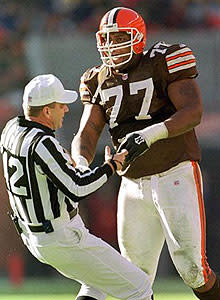Brown's death rekindles memory of coach's love
Sometimes you remember stories for no reason; maybe it's a stray comment that forever lingers or the glimpse of someone in the right light that never goes away. For years whenever I stumble across a Fresno State football game and notice the oddly bearded face of Bulldogs coach Pat Hill, I always think of Orlando Brown.
Hill and I talked once on the phone about Brown, who was found dead at 40 in his Baltimore home this week. It wasn't a long conversation, done as I recall under the duress of a college coach's busy midseason schedule. Brown was big news. The Cleveland Browns had just released him nearly nine months after an official's weighted penalty flag smacked into his eye, temporarily blinding him and sending him into such a confused rage he knocked the referee, Jeff Triplette, to the ground. Brown's eye had yet to recover and Cleveland could no longer keep a player unable to play.
Hill was distraught. In 1993, as an offensive line coach in Cleveland he fell for a raw, unrefined giant of a player from South Carolina State they called "Zeus," and set out to make him a star. There was nothing to say Brown would become any kind of a player in the NFL. Nobody wanted him. He went undrafted. It wasn't hard to sign him – the list of other suitors was exactly zero. Only Hill saw the potential brilliance.
The coach told the player to come early to the team's practice facility long before the other Browns, just as morning was beginning to break and there would be enough light to go onto the field. The workouts lasted three hours. And they did everything you can possibly do with a gigantic offensive lineman who needed to learn the basics of being an NFL tackle. They ran. They pushed sleds. They worked on technique. Hill taught Brown the right way to stand. He showed him how to move his feet. Then when they were done, they went inside for the team's regular meetings and practices.
[Related: Former NFL lineman Brown found dead at age 40]
And after a year and a half something happened – Brown got it.
"All he wanted to do was get better," Hill said that day on the phone. "He didn't talk much. He didn't say much of anything. His actions spoke so loudly they drown out his words. All he wanted to do was be a football player and he worked so hard. He worked harder than everyone else. And when he was done, he was never satisfied. He wanted to keep going."
Looking back, I think it was the love a coach can have for a player that struck me the most. Hill had other players to coach. The years he worked with Brown were tumultuous ones not long before the franchise moved to Baltimore. The NFL is an impersonal business, one in which players are warned by faceless minions that they are about to be slashed from the roster. Their meeting with the head coach upon their release is sometimes the first they have with the man. Hill risked his career to spend so much time with a player nobody ever wanted. And then Zeus Brown rewarded him by becoming good.
When the Browns became the Ravens, Brown became the starter no one thought possible. And in 1999 when a new Cleveland Browns team was formed, six years after Hill first took him on, Brown signed a six-year, $27 million contract to return to Cleveland, the biggest an offensive lineman had ever received. Four months into his first season, Triplette's flag hit him in the eye and he was never the same. Brown spent three years recovering, then ironically signed with the Ravens in 2003 and played three seasons for them. It was there, in Baltimore's locker room after a game with Seattle, where I encountered him for the first time. I introduced myself. He was a pleasant man and he beamed the moment I mentioned Pat Hill's name.
I can't remember his exact words but it was something to the effect of: "He is the reason I am in the NFL."
What I will remember is his face that afternoon, just as I recall the affection that boomed from Hill's voice in the phone three years earlier.
"I can't imagine him without football," Hill said back then, his concern obvious even in a phone receiver. "He was meant to play football. I mean there a lot of guys who love the football life. Everything about football is easy for them except the game. The game for them is hard. Orlando wasn't like that. He liked the hard work. He's just a special, special guy."
After football, Brown came to own the first Fatburger franchise in Maryland in 2009. He was also charged with third degree burglary later that year. But other than that his name was forgotten, popping into my mind on that random Saturday when Fresno State filled the television screen. The last time was two weeks ago when the Bulldogs gave Nebraska a game into the fourth quarter.
Then came word Friday of Brown's death, the cause unannounced. I searched through the archives looking for that long-ago story about the player and the coach who loved him so much that he gave him a career. When I found it, I opened it and then I turned cold. There at the top, was the date:
September 22, 2000.
Exactly 11 years before the day he likely died.
Some stories you never forget.
Other popular stories on Yahoo! Sports:
• Video: Were the critics wrong on Cam Newton?
• Brett Favre gets new football gig
• Playing with pain part of the game for QBs


